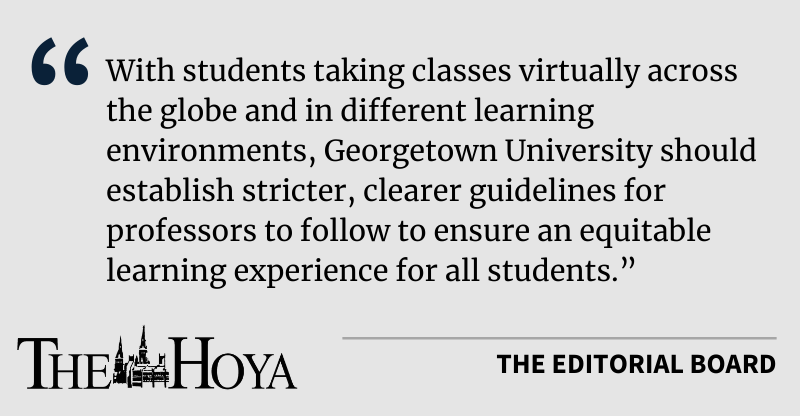No student should be compelled to take a 3 a.m. class synchronously. With students taking classes virtually across the globe and in different learning environments, Georgetown University should establish stricter, clearer guidelines for professors to follow to ensure an equitable learning experience for all students.
As virtual classes continue, students are facing significant barriers caused by a lack of strict policies to guide how professors assign work. The College Academic Council, a student-led organization designed to foster communication between students and faculty, has been working to survey students across all four schools about their experience with virtual learning, CAC President Liddy Kasraian (COL ’21) wrote in an email to The Hoya.
“In general, students wish that they had easy access to a clear set of guidelines that professors are supposed to abide by with regards to online classes,” Kasraian wrote. “If students knew the standards their professors were being held to, they would be better equipped to advocate for their academic needs and know when to reach out to deans or administrators for assistance, when needed.”
In extreme cases, professors’ inflexibility has derailed students’ academic plans. Alex Wang (MSB ’22), an international student taking classes from her home in Shanghai had to take a leave of absence this semester because her classes were not flexible enough to meet her time zone needs.
Trying to do group work without classmates in similar time zones also posed a challenge, Wang said.
“I remember I had to wake up at 3 a.m. for my ethics class,” Wang said in an interview with The Hoya. “Then I realized there’s a lot of group work with my classes this semester. There’s really not many Chinese or Asian students at Georgetown. MSB classes are so small that it is just impossible to find teammates in the same time zone.”
It is unacceptable that students in disparate time zones are being forced to choose between a healthy sleeping schedule and their education because this issue would never happen in a normal in-person learning environment. To ensure all students have equal access to their classes, Georgetown administrators must put strict rules in place dictating how much work professors can assign students.
Many students who filled out a campuswide survey reported an increased workload compared to an in-person semester, according to a university spokesperson. With the additional stress of the COVID-19 pandemic, students should not be asked to take on a larger workload. Students should expect at least six hours of studying a week for every three-credit course, according to the 2020-2021 Undergraduate Bulletin.
Despite this guideline, the amount of work professors are assigning is varying significantly. While professors are struggling alongside students to adjust to the virtual environment, clearer guidelines from Georgetown deans would help them transition while still protecting students’ access to classes.
Student leaders have been advocating for stricter rules pertaining to class workload, according to Siddharth Muchhal (SFS ’21), president of the School of Foreign Service Academic Council.
“Administration continued reminding us of the inherent flexibility that faculty have in their teaching styles, and that students should just reach out to their Deans if there are any issues,” Muchhal wrote in an email to The Hoya.
Deans could save students the undue stress of having to coordinate with all their professors individually by implementing clear policies about assignments across the four schools. These rules should stipulate that professors should assign a workload very similar to what they would during an in-person semester, and deans should verify by cross-referencing previous syllabi.
From its survey, the CAC has determined many students are in favor of clear guidelines for virtual teaching implemented by the university. Not only would such rules allow students to be more informed about what their professors should not be doing, but they would also create a more equitable environment for all students.
For some students, virtual learning means their schedules are out of sync with their professors. Therefore, instructors must record all lectures and provide alternatives to group work.
While Zoom lectures do provide unique challenges to professors and significantly alter the way they teach classes, students’ workload and accessibility must take precedence. Deans must work with professors this semester to establish firm rules regarding both the accessibility of classes and the amount of work assigned. If university officials fail to do so, students’ ability to succeed will undoubtedly suffer.
The Hoya’s editorial board is composed of six students and is chaired by the opinion editor. Editorials reflect only the beliefs of a majority of the board and are not representative of The Hoya or any individual member of the board.









